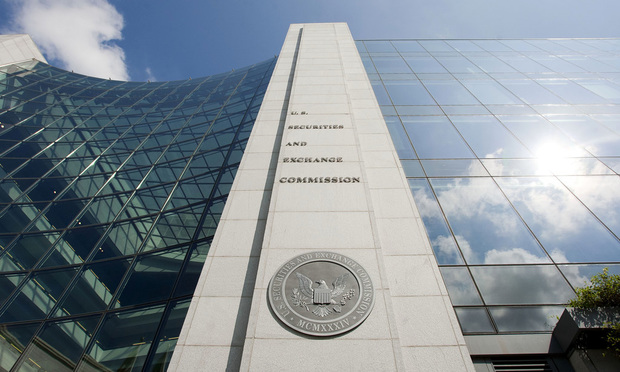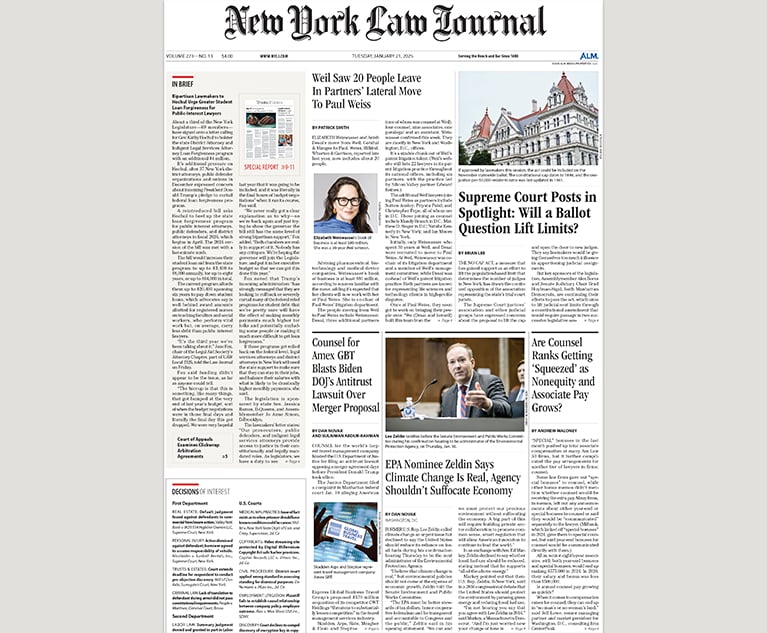Law Firms Turned Creative as Shutdown Slowed Deals and Collections
From midsize firms to large Am Law 100 firms, corporate practices have seen a drag on IPO deals—and collections.
January 25, 2019 at 02:53 PM
6 minute read
 Headquarters of the U.S. Securities and Exchange Commission in Washington, D.C. (Photo: Diego M. Radzinschi/ALM)
Headquarters of the U.S. Securities and Exchange Commission in Washington, D.C. (Photo: Diego M. Radzinschi/ALM)
As the government shutdown dragged on, some corporate practices at law firms have been financially squeezed, unable to collect fees from stalled initial public offerings. Meanwhile, some capital markets practices at law firms took creative approaches to work around the Securities and Exchange Commission's gutted operations.
In a rare event, a biotechnology firm Gossamer Bio on Wednesday disclosed pricing details for a $230 million initial public offering without explicit SEC approval. The company is represented by Latham & Watkins, led by partner Matthew Bush, while Cooley, led by Charles Kim, represents the underwriters.
Before President Donald Trump on Friday agreed to reopen the federal government for three weeks, corporate lawyers this week said some deal teams were thinking much more about the approach taken by Gossamer Bio, which involves removing the so-called delaying amendment language in filing documents. This allows Gossamer Bio to potentially price 20 days after its filing. In a typical IPO, the SEC would declare a registration statement effective.
Some lawyers said this was a viable option during the SEC's near-shutdown under certain circumstances. Others said it's a risky move.
Steven Bochner, a partner at Wilson Sonsini Goodrich & Rosati, said he wouldn't be comfortable with the approach, unless a company was late enough in the process. “If that approach ends up working, it will be because the company is so late in the comment” cycle with the SEC and the deal team is confident that any unresolved SEC comments are not material, Bochner said, adding Nasdaq itself confirmed this guidance Thursday.
“For most companies in the middle of the comment progress [with the SEC], I just think it's a nonstarter,” Bochner said.
Lawyers during the 35-day shutdown continued to explore other finance methods. “We're trying to be creative,” said Gregory Sichenzia, a founding member of New York-based midsize firm Sichenzia Ross Ference, which frequently handles IPOs and securities filings. “There are a few things we can still do to get deals done,” he said Wednesday, such as private placements for public companies and issuing registered stock from a shelf registration.
With the IPO freeze, Sichenzia and leaders of other firms say they were starting to feel the economic pinch themselves, much more so than they were weeks ago.
When representing the underwriters and banks, lawyers typically get paid when the IPO closes. Even when firms represent the company, depending on the fee arrangements with clients, they may get paid a significant portion of their fees only after the deal closes.
“It's certainly had a chilling effect on public transactions, which has certainly affected our revenue,” Sichenzia said about his firm Wednesday. “When you're transactions-based, it's difficult.”
The partial shutdown also strained 80-lawyer New York-based Ellenoff Grossman & Schole, which typically bills flat fees at the end of deals. The firm is one of the most active in IPOs deals in the country.
Firm member Douglas Ellenoff said this week that the shutdown was having “a significant economic impact on us, in terms of the timing of those collections.”
“It's more than a speed bump,” Ellenoff said about the business impact on his firm, “but we are very conservatively managed. We have no debt. We made it through 2008, which was a worse environment, so we know what it's like to lie through tough times.”
Deals Slipping Back
For the large Am Law firms that frequently handle tech deals, leading partners were less forthright to reveal any business impact during the shutdown, maintaining they were as busy as ever. That's because they have been handling IPOs in other stages and other types of deals, they said. They said they also expect billable hours and collections to pick up once the SEC fully opens.
Still, large firms haven't been completely shielded from the effects. Alan Denenberg, a corporate partner at Davis Polk & Wardwell, said this week that the shutdown has prevented some client IPOs from closing. “We have IPOs that would have priced this quarter, they haven't priced,” he said this week.
In that regard, his firm couldn't timely collect on fees. Fees for everyone, for the issuers, the underwriters and others will come later, Denenberg said. “Depending on how long the backlog takes, everything may slip back,” Denenberg said.
Still, Denenberg said his practice is diversified and the firm has been handling many other financing deals. “It's going to become more acute for firms that, as a percentage of their work, are very dependent on IPO closings,” he added.
Gordon Davidson, a corporate partner at Fenwick & West, said this week that the SEC shutdown did not affect the IPOs he is handling. But he sees some possible effect on deals that may go public in February or March due to a backlog of work that SEC will face.
Davidson said his firm is working with several companies that are planning IPOs in the coming year, including during the second quarter. None so far that would have closed in January in any case, he said.
“IPOs are a long time in the making. Companies typically start preparing a year in advance and they're subject to changes in the market and often delayed a few months for other reasons,” Davidson said.
Bochner, the partner at Wilson Sonsini, said this week that he has been working on a few deals that are that are not yet dependent on the SEC. Other deals were stalled by the shutdown, but his firm still didn't see any financial pressure, he said.
Echoing others, he is concerned about any delay as a result of a pile-up of work for the SEC upon reopening. “It's frustrating for sure, for the clients, it's frustrating for the deal teams,” Bochner said.
“For those lawyers and firms that have heavy capital markets business, there's a deferral of activity and deferral of revenue,” Bochner said
This content has been archived. It is available through our partners, LexisNexis® and Bloomberg Law.
To view this content, please continue to their sites.
Not a Lexis Subscriber?
Subscribe Now
Not a Bloomberg Law Subscriber?
Subscribe Now
NOT FOR REPRINT
© 2025 ALM Global, LLC, All Rights Reserved. Request academic re-use from www.copyright.com. All other uses, submit a request to [email protected]. For more information visit Asset & Logo Licensing.
You Might Like
View All
Neighboring States Have Either Passed or Proposed Climate Superfund Laws—Is Pennsylvania Next?
7 minute read
Trending Stories
Who Got The Work
J. Brugh Lower of Gibbons has entered an appearance for industrial equipment supplier Devco Corporation in a pending trademark infringement lawsuit. The suit, accusing the defendant of selling knock-off Graco products, was filed Dec. 18 in New Jersey District Court by Rivkin Radler on behalf of Graco Inc. and Graco Minnesota. The case, assigned to U.S. District Judge Zahid N. Quraishi, is 3:24-cv-11294, Graco Inc. et al v. Devco Corporation.
Who Got The Work
Rebecca Maller-Stein and Kent A. Yalowitz of Arnold & Porter Kaye Scholer have entered their appearances for Hanaco Venture Capital and its executives, Lior Prosor and David Frankel, in a pending securities lawsuit. The action, filed on Dec. 24 in New York Southern District Court by Zell, Aron & Co. on behalf of Goldeneye Advisors, accuses the defendants of negligently and fraudulently managing the plaintiff's $1 million investment. The case, assigned to U.S. District Judge Vernon S. Broderick, is 1:24-cv-09918, Goldeneye Advisors, LLC v. Hanaco Venture Capital, Ltd. et al.
Who Got The Work
Attorneys from A&O Shearman has stepped in as defense counsel for Toronto-Dominion Bank and other defendants in a pending securities class action. The suit, filed Dec. 11 in New York Southern District Court by Bleichmar Fonti & Auld, accuses the defendants of concealing the bank's 'pervasive' deficiencies in regards to its compliance with the Bank Secrecy Act and the quality of its anti-money laundering controls. The case, assigned to U.S. District Judge Arun Subramanian, is 1:24-cv-09445, Gonzalez v. The Toronto-Dominion Bank et al.
Who Got The Work
Crown Castle International, a Pennsylvania company providing shared communications infrastructure, has turned to Luke D. Wolf of Gordon Rees Scully Mansukhani to fend off a pending breach-of-contract lawsuit. The court action, filed Nov. 25 in Michigan Eastern District Court by Hooper Hathaway PC on behalf of The Town Residences LLC, accuses Crown Castle of failing to transfer approximately $30,000 in utility payments from T-Mobile in breach of a roof-top lease and assignment agreement. The case, assigned to U.S. District Judge Susan K. Declercq, is 2:24-cv-13131, The Town Residences LLC v. T-Mobile US, Inc. et al.
Who Got The Work
Wilfred P. Coronato and Daniel M. Schwartz of McCarter & English have stepped in as defense counsel to Electrolux Home Products Inc. in a pending product liability lawsuit. The court action, filed Nov. 26 in New York Eastern District Court by Poulos Lopiccolo PC and Nagel Rice LLP on behalf of David Stern, alleges that the defendant's refrigerators’ drawers and shelving repeatedly break and fall apart within months after purchase. The case, assigned to U.S. District Judge Joan M. Azrack, is 2:24-cv-08204, Stern v. Electrolux Home Products, Inc.
Featured Firms
Law Offices of Gary Martin Hays & Associates, P.C.
(470) 294-1674
Law Offices of Mark E. Salomone
(857) 444-6468
Smith & Hassler
(713) 739-1250








